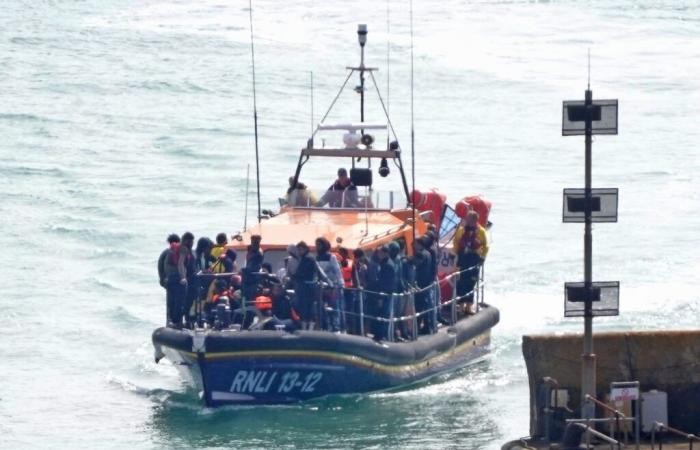From the hills surrounding Dover, in the early morning, the coast is transformed into a scene of hope and despair. We can observe, from afar, highly controlled arrivals. Zodiacs overloaded with migrants, between 50 and 80 people on board, sometimes even kayaks, are intercepted before reaching the coast. Maritime authorities, working with British Border Control, intercept most boats before they reach the shore.
Arrivals are then transferred to the Kent Intake Unit for initial interrogation, possibly with emergency care, before being placed in reception centers. This system allows migrants to receive a small allowance during the duration of their asylum procedure, which can take more than a year.
For Gideon, a refugee helped by the Freedom from Torture association, like for many others, the reality is very different from what he imagined when fleeing his country. His request for asylum was rejected this summer. “Hotels are another form of detention. Sometimes we're not even allowed to go out, we can't even change TV programs, we're constantly monitored.” he laments.
Some desperate refugees even try to return to Europe by hiding in trucks. That's what Mike, a regular at the Cinque Ports Arms, the pub opposite Dover landing stage, talks about. “The French police do nothing, they wash their hands of it. Worse: she purposely lets them arrive at our house. Once here, they (refugees, Editor’s note) realize that there is nothing here either. So they try to return to France, in freight trucks. »
Tackle smugglers
The British government's strategy is in a nutshell: deterrence. It is literally about deterring crossings, by directly targeting smugglers. Mike Tapp, Labor MP for immigration, criticizes “gimmicky measures of previous conservative governments”. In fact, the very first measure of Keir Starmer's Labor government, which came to power in July 2024, was to cancel the law which authorized the expulsion of illegal migrants in Rwanda.
Instead, the new government wants to provide the means: “We do not have a magic wand to solve the problem of illegal migration, continues Mike Tapp. But to fight against Channel crossings, we have budgeted 75 million pounds sterling (nearly 90 million euros) and synchronized the National Crime Agency, the Border Force, Europol and even the intelligence services of MI5. We will treat smugglers the same way we treat terrorism. It's going to take time. »
At the port, behind the border control boat parking lot, sealed canoes collect the algae. These are the « taxi boats” that were seized. They are made in China and bought online by smugglers, some are even patched up with heavy adhesive tape. A port security officer explains that there are decreasing rates depending on the country of origin: “Smugglers charge up to €100,000 per crossing. Between €3,000 and €4,000 per person coming from Albania, between €2,000 and €2,500 for Turkey, and for Indians, Iranians, Kurds, Pakistanis and Afghans, it is between €1,100 and €1,500. »
Payment for crossings is often arranged in the country of origin, making tracking down smugglers difficult. For Kay Marsh, of the Samphire Migrants association in Dover, the « deterrence » is not enough, more must be done. “The government does not seem interested in a viable and secure alternative for these refugees who arrive at all costs. Adapted solutions should be offered rather than simply blocking arrivals. »
“These people who are fleeing their country are not bad”
For the Imix association, it is about changing the way we look at migrants and the migration problem in general. “Here in Dover, people realize the misery of the situation, and that these people who are fleeing their country are not bad. Many are graduates, doctors and caregivers, or teachers, in their country of origin. We are doing our best to get the media to talk about this issue differently and to finally see the human side of the situation. »
On the association side, we continue to highlight the distress of migrants when they arrive, the increasing pressure on volunteers and the limited resources of humanitarian organizations.
In the shopping street of Dover, a forty-year-old laments that nothing is changing, whatever the government: “Last year, the Tories had the idea of funding Albanian influencers to make TikTok videos. Supposedly to dissuade people from coming. This year, with Labor, we thought that politics would be more humane, but it's the same thing. Nobody really wants to tackle the problem, or the reception of refugees. Not just stopping them from coming, but what to do when they are there, since they are there. »
A little further on, another passerby, Barbara, returns to the number of arrivals on October 24, which changed the figures for the year: “The other day, more than 500 arrived, crammed into eleven boats. It costs the government millions. They arrive by the hundreds every day. » Nearly a thousand people disembarked in two days, bringing the total to 29,578 since the start of the year, more than the number of crossings recorded over the whole of 2023. A figure which, however, remains lower than that of 2022, when 45,791 arrivals had been recorded.
Migration issues continue to weigh on the Dover region, making the humanitarian crisis that plays out with each crossing more visible than ever. As the waters of the English Channel continue to welcome overcrowded dinghies, the situation remains one of the UK government's thorniest challenges.






